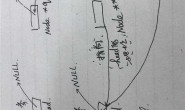#include<stdio.h>
#include<string.h>
int main()
{
int i;
int c=0;
char zy[30];
printf("Enter some words:\n");
scanf("%s",zy);
for (i=0;i<30;i++)//开始进行循环
{
c++;//记录单词的长度
if (zy[i]=="" "")//当找到空格时
{
zy[i-c+1]=zy[i-c+1]-32;//对此单词的首字母小写变大写
c=0;//重定义长度
continue;
}
}
printf("%s",zy);
printf("\n");
return 0;
}
|
|
|
问题现在是
输入一句有空格的全是小写的句子 结果只输出第一个空格之前的 而且还不变成大写 |
|
| 36分 |
修改如下:
#include<stdio.h>
#include<string.h>
int main()
{
int i;
char zy[30];
printf("Enter some words:\n");
scanf("%[^\n]s", zy);
zy[0] &= 223; //将第一个单词的首写字母大写
for (i = 1; i < 30 && zy[i]; i++) //开始进行循环
{
if (zy[i] == "" "" && zy[i + 1])//当找到空格时
{
zy[i + 1] &= 223;//对此单词的首字母小写变大写
continue;
}
}
printf("%s", zy);
printf("\n");
return 0;
}
//we are family
//We Are Family
|
| 2分 |
scanf(“%29[^\n]s”, zy);
小心驶得万年船! |
| 2分 |
Format Specification Fields: scanf and wscanf Functions
A format specification has the following form: %[*] [width] [{h | l | I64 | L}]type The format argument specifies the interpretation of the input and can contain one or more of the following: White-space characters: blank (“” “”); tab (“”\t””); or newline (“”\n””). A white-space character causes scanf to read, but not store, all consecutive white-space characters in the input up to the next non–white-space character. One white-space character in the format matches any number (including 0) and combination of white-space characters in the input. Non–white-space characters, except for the percent sign (%). A non–white-space character causes scanf to read, but not store, a matching non–white-space character. If the next character in stdin does not match, scanf terminates. Format specifications, introduced by the percent sign (%). A format specification causes scanf to read and convert characters in the input into values of a specified type. The value is assigned to an argument in the argument list. When the first format specification is encountered, the value of the first input field is converted according to this specification and stored in the location that is specified by the first argument. The second format specification causes the second input field to be converted and stored in the second argument, and so on through the end of the format string. An input field is defined as all characters up to the first white-space character (space, tab, or newline), or up to the first character that cannot be converted according to the format specification, or until the field width (if specified) is reached. If there are too many arguments for the given specifications, the extra arguments are evaluated but ignored. The results are unpredictable if there are not enough arguments for the format specification. Each field of the format specification is a single character or a number signifying a particular format option. The type character, which appears after the last optional format field, determines whether the input field is interpreted as a character, a string, or a number. The simplest format specification contains only the percent sign and a type character (for example, %s). If a percent sign (%) is followed by a character that has no meaning as a format-control character, that character and the following characters (up to the next percent sign) are treated as an ordinary sequence of characters, that is, a sequence of characters that must match the input. For example, to specify that a percent-sign character is to be input, use %%. An asterisk (*) following the percent sign suppresses assignment of the next input field, which is interpreted as a field of the specified type. The field is scanned but not stored. To read strings not delimited by space characters, a set of characters in brackets ([ ]) can be substituted for the s (string) type character. The corresponding input field is read up to the first character that does not appear in the bracketed character set. If the first character in the set is a caret (^), the effect is reversed: The input field is read up to the first character that does appear in the rest of the character set. Note that %[a-z] and %[z-a] are interpreted as equivalent to %[abcde…z]. This is a common scanf function extension, but note that the ANSI standard does not require it. |




